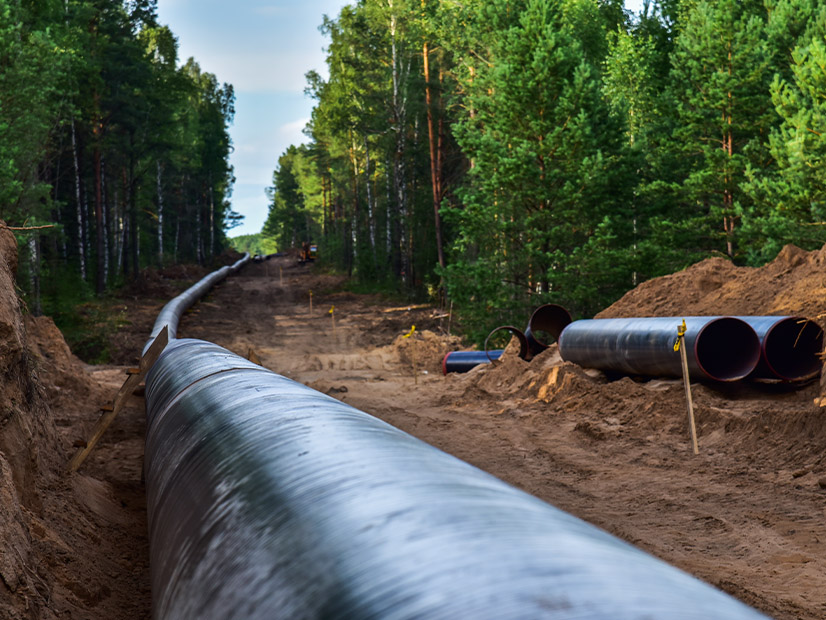FERC on April 16 rejected rehearing requests on a certificate it granted to TC Energy to expand its Gas Transmission Northwest (GTN) pipeline’s capacity into the Northwest over three states’ objections and Commissioner Allison Clements’ dissent (CP22-2-001).
The XPress project would provide 150,000 dekatherms per day of incremental firm transportation service from Idaho’s border with British Columbia to the Malin Meter Station in Klamath County, Ore., near the California state line. It has signed three deals with terms of 30-33 years for the pipeline’s entire capacity.
While the pipeline has offtake deals with customers, California, Oregon and Washington argued that their climate policies, which require significant economywide natural gas cuts, will lower gas demand in coming decades and asked FERC to reject the proposed expansion.
The commission mostly disagreed, finding the deals for 100% of its capacity significant evidence of need and that the project would cut costs to consumers while increasing supply diversity.
The case covers similar arguments to a FERC-approved Transcontinental Gas Pipeline expansion, opposed by New Jersey regulators because of their state’s climate targets. That decision has been appealed to the D.C. Circuit Court of Appeals, which held oral arguments on it in March. (See FERC Approves Pipeline Expansion Despite New Jersey’s Worries.)
The Western states argued the deals were not enough to show demand and cited another D.C. Circuit decision in Environmental Defense Fund v. FERC, in which the court rejected the commission’s approval because it had relied on a single-precedent agreement between the pipeline and an affiliate as evidence of need.
But none of the buyers is an affiliate of GTN, nor is there evidence of self-dealing, so the EDF case does not apply, FERC said.
“We continue to find that GTN presented sufficient evidence of project need — it executed precedent agreements for 100% of the project’s capacity with unaffiliated shippers, each for a duration of 30 or more years — notwithstanding the legislation and policies that the states argue will reduce demand,” FERC said. “These precedent agreements, as noted herein, are significant evidence of need.”
The predictions that state climate laws will cut gas demand to make the expansion unneeded are speculative, FERC said. While the three West Coast states have climate laws, half the capacity is for Intermountain Gas, which serves customers in Idaho.
Clements argued that GTN’s rate case offered different information on future gas demand; that FERC should have examined alternatives to the expansion in its environmental review; and that it should be able to assess the significance of greenhouse gas emissions.
The three states submitted evidence in a supplemental filing from GTN’s rate case, which the majority held could not be considered due to late filing. Clements said the supplemental filing should have been accepted because it included information central to the case.
The states had tried to get analysis from the firm that their laws would cut its demand, but GTN dismissed those concerns as speculative; then in the rate case, it claimed future demand was at serious risk because of their climate laws, Clements wrote.
“Although GTN asserted in its data request response that the effect of state laws was too speculative to be considered for purposes of the certificate proceeding, its witnesses said the opposite for purposes of supporting an increase in GTN’s rates,” Clements said.
Contracts for 40% of the pipeline’s existing capacity will expire in 2028, and local delivery companies subject to the three states’ laws hold 41% of that expiring capacity.
“Thus, it is entirely possible (if not likely) that the three shippers who signed precedent agreements could access this existing capacity to meet their transportation needs as the current capacity holders reduce their reliance on natural gas pursuant to state legal mandates,” Clements said.
FERC should have accepted the state’s filing of the rate case information because it undermines the foundation of the certificate order to the point where it cannot be rationally sustained on rehearing, Clements said.
The expansion would increase the pipeline’s capacity by 5% and the region’s total pipeline capacity by 1.5%, and the three West Coast states represent 95% of the demand, with Idaho representing just 5%, she said.
“Intermountain is unlikely to need any new capacity because, as GTN’s own rate case witnesses predict, the stringent decarbonization laws and renewable energy initiatives in Idaho’s neighboring states will drive down regional demand for gas and thereby demand for GTN’s existing gas transportation capacity,” Clements said.
FERC considered updating its procedures for granting new pipelines certificates, but its proposal ran into steep opposition from the industry and on Capitol Hill, where it helped sink former Chair Richard Glick’s renomination. Clements argued in her dissent that this case shows why an updated policy statement on gas certificates is needed.
“To avoid repeating these mistakes, the commission should finalize an updated certificate policy statement and implement enhanced procedures allowing us to fully evaluate all factors that actually do bear on the public interest in 2024, including the effect of state laws and renewable energy initiatives,” Clements said.


